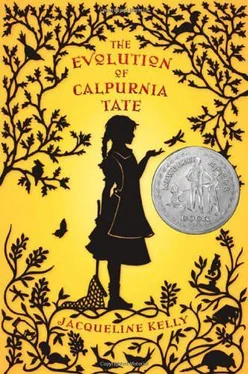Jacqueline Kelly - The Evolution of Calpurnia Tate
Здесь есть возможность читать онлайн «Jacqueline Kelly - The Evolution of Calpurnia Tate» весь текст электронной книги совершенно бесплатно (целиком полную версию без сокращений). В некоторых случаях можно слушать аудио, скачать через торрент в формате fb2 и присутствует краткое содержание. Город: New York, Год выпуска: 2009, ISBN: 2009, Издательство: Macmillan : Henry Holt and Company, Жанр: Детская проза, на английском языке. Описание произведения, (предисловие) а так же отзывы посетителей доступны на портале библиотеки ЛибКат.
- Название:The Evolution of Calpurnia Tate
- Автор:
- Издательство:Macmillan : Henry Holt and Company
- Жанр:
- Год:2009
- Город:New York
- ISBN:978-0-8050-8841-0
- Рейтинг книги:5 / 5. Голосов: 1
-
Избранное:Добавить в избранное
- Отзывы:
-
Ваша оценка:
- 100
- 1
- 2
- 3
- 4
- 5
The Evolution of Calpurnia Tate: краткое содержание, описание и аннотация
Предлагаем к чтению аннотацию, описание, краткое содержание или предисловие (зависит от того, что написал сам автор книги «The Evolution of Calpurnia Tate»). Если вы не нашли необходимую информацию о книге — напишите в комментариях, мы постараемся отыскать её.
The Evolution of Calpurnia Tate — читать онлайн бесплатно полную книгу (весь текст) целиком
Ниже представлен текст книги, разбитый по страницам. Система сохранения места последней прочитанной страницы, позволяет с удобством читать онлайн бесплатно книгу «The Evolution of Calpurnia Tate», без необходимости каждый раз заново искать на чём Вы остановились. Поставьте закладку, и сможете в любой момент перейти на страницу, на которой закончили чтение.
Интервал:
Закладка:
I lay on my back and watched a pair of swallows racing up and down the river, tumbling like acrobats in pursuit of invisible bugs. Despite my hours of freedom, the summer was not proceeding as I’d envisaged. Nobody was interested in the Questions that I wrote in my Notebook. Nobody was interested in helping me figure out the Answers. The heat sapped the life out of everybody and everything.
I thought of our beloved, big old house and how sad it looked in the middle of the yellow dried-out lawn. Usually the grass was soft and cool and green, inviting you to take off your boots and run across it barefoot and play Statues, but now it was a scorched bright gold and as menacing to the feet as straw stubble. The yellow grass made it hard to see my brand-new species of big yellow grasshopper. You couldn’t find them until you practically stepped on them. Then they would zing upward and fly ponderously on clacking wings for a few feet and disappear in the grass again. Catching them was difficult, despite their being fat and slow. Funny how the smaller and quicker emerald ones were such a snap to catch. They were just too easy to spot. The birds spent their days gobbling them up while the yellow ones hid nearby and taunted their less-fortunate brothers.
And then I understood. There was no new species. They were all one kind of grasshopper. The ones that were born a bit yellower to begin with lived to an old age in the drought; the birds couldn’t see them in the parched grass. The greener ones, the ones the birds picked off, didn’t last long enough to grow big. Only the yellower ones survived because they were more fit to survive the torrid weather. Mr. Charles Darwin was right. The proof lay in my own front yard.
I lay in shock in the water thinking about this, staring at the sky, looking for some flaw in my reasoning, some crack in my conclusion. I could find none. Then I splashed my way to the bank. I hauled myself out by some handy elephant ears, dried off with my pinafore, dressed as fast as I could, and ran home.
When I got back to the house, I found the whole family clustered around a busted-open crate in the hallway. In the middle of the excelsior nest sat a squat, black metal machine with four blades on the front and a glass reservoir on the back into which my father poured kerosene. In the middle of the blades, a round brass boss proclaimed in curly script, Chicago’s Finest Wind Machine .
Father said, “Stand back.” He struck a match and set the thing alight. It filled the room with a mineral stink and a great whoosh of air. My brothers all cheered. I cheered too but for a different reason.
Life in our house got somewhat easier after that. Mother retired at midday with her wind machine, and all our lives got better, especially Father’s, whom she sometimes invited to retire with her.
It took me a week to get up the nerve to visit Grandfather again. He was sitting in his laboratory on a dilapidated armchair, the oozing stuffing mined by mice.
I said, “I know why the big grasshoppers are yellow and why the little ones are green.” I told him my discovery and how I’d figured it out. I shifted from foot to foot as he looked at me and listened in silence. After a while he said, “Did you come up with this on your own? With no help?”
“Yes,” I said, then told him about my humiliating trip to the Lockhart library. He stared at me for a moment with an odd expression on his face—perhaps surprise, perhaps consternation—as if I were a species he’d never seen before. He said, “Come with me.”
He didn’t speak a word as we walked to the house. Oh, dear. I had done the unthinkable, not once, but twice, by interrupting him at his work. Was he going to turn me over to Mother for yet another lecture on good manners? He led me into the library, where we children were not supposed to go. So he was going to deliver the lecture himself. Perhaps he would berate me for my clumsy theory. Or perhaps he would switch me across the hands. My dread grew. Who was I—Callie Vee Tate of Fentress, Texas—to think I could even contemplate such matters? A nobody from nowhere.
Despite my fear, I took a good look around the room, since I knew I’d never have the chance again. The library was dim, even with the heavy bottle-green velvet drapes drawn back from the tall double window. Right by the window sat a huge leather armchair and a spool table holding a lamp for reading. There were books on the floor by the chair and more books stacked in tall wooden shelves made from our failed pecan trees (you couldn’t escape the enduring fact of pecans in our lives). There was a large oak desk covered in intriguing oddities: a blown ostrich egg on a carved wooden stand, a microscope nesting in a shagreen leather case, a carved whale’s tooth etched with a bosomy lady not exactly contained by her corset. The family Bible and a huge dictionary with its own magnifying glass lay side by side next to a red plush album full of cramped formal portraits of my ancestors. So. Would I be getting the Bible lecture or the Letting-Down-My-Ancestors lecture? I waited while he made up his mind. I glanced around the walls, which were covered with shallow boxes displaying alarming stick insects and bright multicolored butterflies. Below each gay scrap of color was a scientific name in my grandfather’s careful copperplate script. I forgot myself and went over to peer at them.
“Bear,” said Grandfather.
Huh? I thought.
“Watch the bear,” he said, just as I tripped on the open sneering mouth of a black bearskin rug, its fangs a trap in the gloom for the unwary.
“Right. Bear. Sir.”
Grandfather unthreaded his watch chain to remove a tiny key. He unlocked a tall glass cabinet crammed with more books, preserved birds, bottled beasts, and other curios. I sidled over to get a better look at this irresistible display. A misshapen armadillo caught my eye, warped and buckled and lumpy, obviously stuffed by the most inept amateur. Why did he have that? I could have done better. Next to it was a five-gallon specimen bottle of thick glass containing the strangest beast I had ever seen. A thick, blobby form, multiple arms, two big glaring eyes distorted by the glass into huge saucer orbs, the stuff of nightmares. What on earth was it? I drew closer.
Grandfather reached into the stack of books. I saw Dantes Inferno next to The Science of Hot Air Ballooning. There was A Study of Mammalian Reproduction and A Treatise on Drawing the Female Nude. He extracted a book covered in rich green morocco leather handsomely tipped with gold. He polished it with his sleeve, although I could see no dust on it. Ceremoniously, he bowed and offered it to me. I looked at it. The Origin of Species. Here, in my own house. I received it in both my hands. He smiled.
Thus began my relationship with Granddaddy.
Chapter 2
THE MEASURE OF THE MORNING
The laws governing inheritance are quite unknown; no one can say why . . . the child often reverts in certain characters to its grandfather. . . .
THREE DAYS LATER, I crept downstairs and went out onto the front porch very early before the daily avalanche of my brothers could crack open the peace of the morning. I scattered a handful of sunflower seeds thirty paces down the drive to draw the birds and then I sat down on the steps on a ratty old cushion I’d scavenged from the trunk room. I made a list in my red leather Notebook of everything that moved. Isn’t that what naturalists do?
One of the sunflower seeds hopped across the slate tiles of the front walk. Odd, that. On inspection it turned out to be a tiny toad, a quarter of an inch long, hopping mightily after an escaping millipede, itself no bigger than a thread, both going for all they were worth until they disappeared in the grass. Then a wolf spider, startling in size and hairiness, streaked over the gravel, either chasing something smaller or being chased by something bigger, I couldn’t tell which. I reckoned there must be a million minor dramas playing out around the place without ceasing. Oh, but they were hardly minor to the chaser and the chasee who were dealing in the coin of life and death. I was a mere bystander, an idler. They were playing for keeps.
Читать дальшеИнтервал:
Закладка:
Похожие книги на «The Evolution of Calpurnia Tate»
Представляем Вашему вниманию похожие книги на «The Evolution of Calpurnia Tate» списком для выбора. Мы отобрали схожую по названию и смыслу литературу в надежде предоставить читателям больше вариантов отыскать новые, интересные, ещё непрочитанные произведения.
Обсуждение, отзывы о книге «The Evolution of Calpurnia Tate» и просто собственные мнения читателей. Оставьте ваши комментарии, напишите, что Вы думаете о произведении, его смысле или главных героях. Укажите что конкретно понравилось, а что нет, и почему Вы так считаете.












